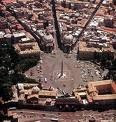Dopo
la crisi del 1953, ed il difficile 2018, anche per il 2019, l' Orologio dell'apocalisse (
Doomsday Clock) ideato nel 1947, dopo la fine della disastrosa seconda guerra mondiale, dagli scienziati della rivista
Bulletin of the Atomic Scientists dell'Università di Chicago per misurare il pericolo di una ipotetica fine del mondo. Un tempo si prendeva in considerazione solo la guerra, oggi anche altri fattori, come i cambiamenti climatici. Siamo a due minuti dalla mezzanotte, l'ora dell'apocalisse. Come nel 2018, come nel 1953. Una delle date più importanti che si è data l'umanità, anche se tardivamente, è il 27 gennaio, il Giorno della Memoria, il giorno in cui l'Armata Rossa libererà il campo di Auschwitz. In Italia è stato istituzionalizzato a partire dal 2000.A livello globale solo dal 2005
con una risoluzione dell'ONU*. Ci son voluti 60anni per istituzionalizzarlo! Quando la storia si muove con estrema lentezza quando deve condannare se stessa. Ma ci mette un niente a spazzare via l'umanità.Milioni di ebrei, e poi anche Rom, Sinti, testimoni di Geova, asociali, omosessuali, criminali e prigionieri politici, dovevano sparire dalla faccia della terra per la loro ragione di essere ciò che erano o avevano scelto di essere. Ricordare per non dimenticare. Si dice giustamente. In un mondo sempre più complesso, e che vede la storia ripetersi. La storia, anche a parer mio, non si ripete mai nello stesso modo, non ci saranno più olocausti, camere a gas, stermini di milioni di ebrei. Ma nel mediterraneo abbiamo fatto morire migliaia di migranti, una strage che continua mentre l'Europa si sta spezzando come un puzzle che si scompone, con i nazionalismi che prendono il sopravvento ed i nazionalismi portano solo guerre e catastrofi. L'odio contro gli ebrei esiste ancora, così come contro gli omosessuali, i Rom, i Sinti, gli oppositori politici, in un mondo propenso a rinunciare agli ideali di libertà, uguaglianza e fratellanza, per l'ossessione dell'ordine e della sicurezza. Ricordare, per non dimenticare, nella consapevolezza di ciò che sta accadendo, ogni giorno, intorno a noi.
mb
*testo risoluzione ONU 1 novembre 2005
Resolution adopted by the General Assembly on the Holocaust Remembrance (A/RES/60/7, 1 November 2005)
The General Assembly,
Reaffirming the
Universal Declaration of Human Rights, which proclaims that everyone is entitled
to all the rights and freedoms set forth therein, without distinction of any kind, such as race,
religion or other status,
Recalling article 3 of the Universal Declaration of Human Rights, which states that everyone has
the right to life, liberty and security of person,
Recalling also article 18 of the Universal Declaration of Human Rights and article 18 of the
International Covenant on Civil and Political Rights, which state that everyone has the right to
freedom of thought, conscience and religion,
Bearing in mind that the founding principle of the
Charter of the United Nations, "to save
succeeding generations from the scourge of war", is testimony to the indelible link between the
United Nations and the unique tragedy of the Second World War,
Recalling the
Convention on the Prevention and Punishment of the Crime of Genocide, which was
adopted in order to avoid repetition of genocides such as those committed by the Nazi regime,
Recalling also the preamble of the Universal Declaration of Human Rights, which states that
disregard and contempt for human rights have resulted in barbarous acts which have outraged the
conscience of mankind,
Taking note of the fact that the sixtieth session of the General Assembly is taking place during
the sixtieth year of the defeat of the Nazi regime,
Recalling the twenty-eighth special session of the General Assembly, a unique event, held in
commemoration of the sixtieth anniversary of the liberation of the Nazi concentration camps,
Honouring the courage and dedication shown by the soldiers who liberated the concentration camps,
Reaffirming that the Holocaust, which resulted in the murder of one third of the Jewish people,
along with countless members of other minorities, will forever be a warning to all people of the
dangers of hatred, bigotry, racism and prejudice,
1.
Resolves that the United Nations will designate 27 January as an annual International Day of
Commemoration in memory of the victims of the Holocaust;
2.
Urges Member States to develop educational programmes that will inculcate future generations
with the lessons of the Holocaust in order to help to prevent future acts of genocide, and in this
context commends the Task Force for International Cooperation on Holocaust Education, Remembrance
and Research;
3.
Rejects any denial of the Holocaust as an historical event, either in full or part;
4.
Commends those States which have actively engaged in preserving those sites that served as
Nazi death camps, concentration camps, forced labour camps and prisons during the Holocaust;
5.
Condemns without reserve all manifestations of religious intolerance, incitement, harassment
or violence against persons or communities based on ethnic origin or religious belief, wherever
they occur;
6.
Requests the Secretary-General to establish a programme of outreach on the subject of the
"Holocaust and the United Nations" as well as measures to mobilize civil society for Holocaust
remembrance and education, in order to help to prevent future acts of genocide; to report to the
General Assembly on the establishment of this programme within six months from the date of the
adoption of the present resolution; and to report thereafter on the implementation of
the programme at its sixty-third session.





Commenti
Posta un commento